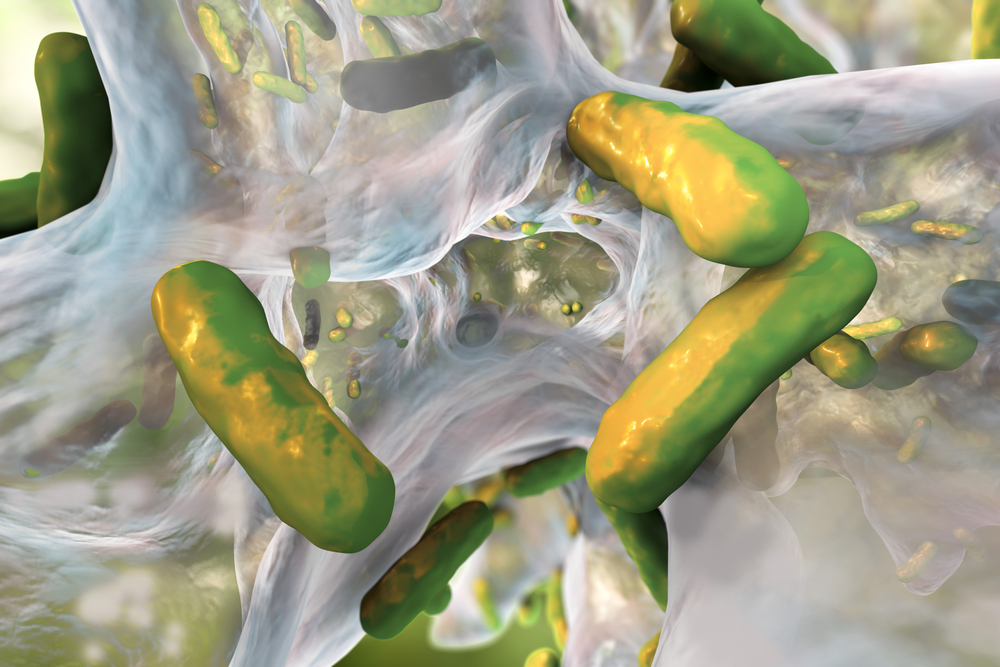Cancer Gene, PTEN, Appears to Work with CFTR to Prevent Lung Infections, Study Reports
Written by |

One of the most frequently mutated genes in cancer, PTEN, in involved in the repeated lung infections that trouble cystic fibrosis patients — not because PTEN is abnormal in CF, but because it is unable to work with CFTR gene, which is mutated in this disease, to help clear the lungs of bacteria, researchers at Columbia University Medical Center (CUMC) report.
Their study, “Cystic Fibrosis Transmembrane Conductance Regulator Attaches Tumor Suppressor PTEN to the Membrane and Promotes Anti Pseudomonas aeruginosa Immunity”, was published in the journal Immunity.
CF, characterized by muco-obstructive airways, is caused by mutations in the CF transmembrane conductance regulator (CFTR) gene. Most result in little to no CFTR protein at the cell surface, where it controls fluid secretion.
An abnormal or absent CFTR protein leads to airway surface dehydration, and the buildup of a thick and sticky mucus in which inhaled pathogens — particularly Pseudomonas aeruginosa bacteria — can thrive. The resulting chronic inflammation and infection cause progressive lung damage and scarring (fibrosis).
Recent findings have shown a link between CFTR and anti-inflammation mechanisms. The defective or absent CFTR in CF patients not only leads to poorly regulated mucus production, but also to impaired anti-inflammatory activity.
The researchers were surprised to find that mice lacking the PTEN gene had symptoms similar to those observed in CF patients. PTEN protein is best known for its tumor-suppressor activity, protecting cells from becoming cancerous.
“We had no idea that PTEN was involved in cystic fibrosis,” Alice Prince, MD, the study’s senior author, said in a press release. “We were studying mice that lack a form of PTEN and noticed that they had a severe inflammatory response to Pseudomonas and diminished clearance that looked a lot like what we see in patients with cystic fibrosis.”
Researchers found that PTEN regulates anti-inflammatory responses and helps eradicate Pseudomonas from the lungs. However, its effects are dependent on a direct interaction between PTEN and the CFTR protein. CFTR binds to PTEN and moves them both to the cell membrane, or surface, where they do their essential work.
With little to no CFTR moving to the cell surface in CF patients, PTEN cannot reach the membrane and regulate inflammation. But, when transport of CFTR to the cell membrane is increased in CF patients, through specific therapies, higher PTEN levels are observed.
“These findings suggest that improved CFTR trafficking could enhance P. aeruginosa clearance from the CF airway by activating PTEN-mediated anti-bacterial responses and might represent a therapeutic strategy,” the team wrote, and suggested that treatments coaxing even non-working CFTR to the cell surface might allow for greater PTEN activity.
“Another idea is to find drugs that improve PTEN membrane anti-inflammatory activity directly,” said Sebastián Riquelme, PhD, study lead author. “There are several PTEN promotors under investigation as cancer treatments that might prove useful in cystic fibrosis.”
The team also hypothesized that PTEN may be linked to the increased incidence of gastrointestinal cancer in CF patients.
“With better clinical care, these [CF] patients are living much longer, and we’re seeing a rise in gastrointestinal cancers,” Prince said. “Some studies suggest that CFTR may be a tumor suppressor. Our work offers an alternative hypothesis, where CFTR mutations and lack of its partner, PTEN, might be driving this cancer in patients with cystic fibrosis.”






